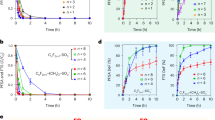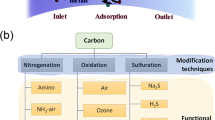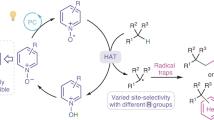Abstract
THE phenol–hypochlorite reaction for ammonia was first described by D. D. Van Slyke and A. Hiller1, and later was modified by M. Borsook2 and J. A. Russell3. Unfortunately this reaction cannot be applied directly to biological fluids, because certain amino-acids, alkylamines and ammonium salts can react to a certain extent. Moreover, Russell's modification, being dependent on small concentrations of molybdenum ion, can be affected by the presence of thiols, thioamides, and in general by any chelating andreducing substances.
This is a preview of subscription content, access via your institution
Access options
Subscribe to this journal
Receive 51 print issues and online access
$199.00 per year
only $3.90 per issue
Buy this article
- Purchase on Springer Link
- Instant access to full article PDF
Prices may be subject to local taxes which are calculated during checkout
Similar content being viewed by others
References
Van Slyke, D. D., and Hiller, A., J. Biol. Chem., 102, 499 (1933).
Borsook, M., J. Biol. Chem., 110, 481 (1935).
Russell, J. A., J. Biol. Chem., 156, 457 (1944).
Philpot, J. S. L., and Small, P. A., Biochem. J., 32, 542 (1938).
Author information
Authors and Affiliations
Rights and permissions
About this article
Cite this article
MUFTIC, M. A New Phenol–Hypochlorite Reaction for Ammonia. Nature 201, 622–623 (1964). https://doi.org/10.1038/201622a0
Issue Date:
DOI: https://doi.org/10.1038/201622a0
This article is cited by
-
A new continuous measurement method for gaseous ammonia by counter-current flow tube sampling and indophenol reaction
Journal of Atmospheric Chemistry (2016)
-
Characterization of a recombinant (+)-γ-lactamase from Microbacterium hydrocarbonoxydans which provides evidence that two enantiocomplementary γ-lactamases are in the strain
Applied Microbiology and Biotechnology (2015)
-
Candida amidevorans sp. nov., a new ascomycetous anamorph yeast from soil
Antonie van Leeuwenhoek (1987)
-
Fluoroacetamide resistance mutations in Chlamydomonas reinhardtii
Archives of Microbiology (1987)
-
Induction control of purine catabolism in Schizosaccharomyces pombe
Current Genetics (1985)
Comments
By submitting a comment you agree to abide by our Terms and Community Guidelines. If you find something abusive or that does not comply with our terms or guidelines please flag it as inappropriate.



